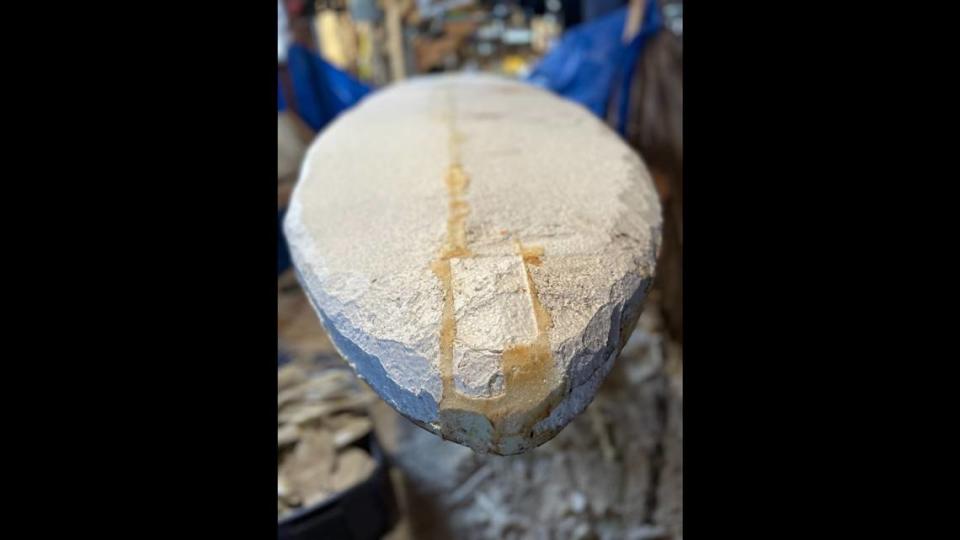He’ll paddle from Tacoma to Port Townsend — on a board made of trash. Here’s why
Ken Campbell’s paddle board is trash — literally.
I’m not trying to be mean. Facts are facts.
Campbell, 60, is the director of the Tacoma-based environmental advocacy and education nonprofit Ikkatsu Project, which he helped to found in 2012. The nonprofit’s original charge was specific: helping to clean trash and debris from remote shorelines and beaches in the aftermath of the 2011 tsunami off the coast of Japan. But these days the goal is much larger. The Ikkatsu Project’s main target, through outreach, activism and education, is combating the proliferation of plastics and the way plastic-related pollution is choking and poisoning so many of our beaches and waterways.
All of this means that Campbell, who sports a silver goatee and the toughened skin of a man who’s spent a lot of time outdoors, has collected a lot of garbage in his time. He also knows a thing or two about raising awareness for environmental causes that might otherwise be ignored. Perhaps it was only natural that the two interests would collide.
On June 2, shortly after 7 p.m., Campbell will depart from the Dock Street Marina, setting a course out of the Thea Foss Waterway and up the Puget Sound all the way to Port Townsend. He’ll do so on a homemade paddle board, which he has affectionately christened the “Palo de Basura” — or “garbage stick” — an unusual but allegedly functional craft made from marine debris he’s collected from local beaches
Campbell will be competing in what’s known as the Seventy48, an offbeat but surprisingly competitive race open only to human-powered vessels. The race’s specifics are all in the name: competitors, of which there will be many, of all shapes and levels of absurdity, will have 48 hours to travel the 70 miles between T-Town and PT.
Campbell, it’s worth noting, is not trying to win. Let’s get that out of the way now. Success, he told me by phone this week, will simply mean finishing the grueling trek on a board he made in his garage from reused plywood and chunks of old dock foam
As long as he brings attention to his cause along the way, that is.

“I had somebody tell me that, you know, what you’re doing is a gimmick. And I don’t know if they meant that in a good way or not, but it is a gimmick. It’s absolutely a gimmick,” Campbell said. “I mean, I made a 16-foot paddle board using foam found on the beaches in South Puget Sound, and the idea is to give people the chance to have the conversation started for them. Instead of me coming up to them and badgering them about plastic, me floating on a pile of plastic garbage tends to start the conversation for me.”
Campbell has a point, of course. After all, if it wasn’t for his trash board I wouldn’t have called him. And if it wasn’t for his wild idea, there’s a good chance you wouldn’t be reading a column about the staggering amount of plastic garbage that’s floating in our oceans.
Sure, deep down we know it’s a problem — maybe we’ve seen photos of the 1.6 million square-kilometer Great Pacific Garbage Patch or our kids have chastised us for asking for straws at Starbucks — but for many, there’s an understandable disconnect between our day-to-day use of plastics and what happens after it goes in the trash. Every year, according to varying estimates, plastic pollution kills thousands of marine animals, to say nothing of the other dire environmental impacts, from the extraction of fossil fuels that help make plastic to the dangerous spread of toxic microplastics as it slowly biodegrades. None of this is standard dinner table conversation, however..
For the last decade, that’s the often uphill battle Campbell has been waging. The Ikkatsu Project can scour area beaches and fill up all the trash bags it can find, but until all of us take meaningful steps to limit our consumption of plastics — particularly of the single-use variety, like the pallets of plastic water bottles that fly off the shelf at Costco every day — the toll on our environment and the world around us will continue to grow.
Bottom line: The amount of plastic we consume and the environmental threats it poses is a problem that demands direct attention, meaning the only real option is facing it head-on — and that starts with talking about it.
Hence, Campbell’s Palo de Basura was born.
On Tuesday, Campbell admitted to nerves leading up to the big race. He’s confident in his board, and confident in his paddling, but 70 miles isn’t a short distance — and once you get in the water, all by yourself, anything can happen, he said.
This will be his third time participating in the Seventy48, but his first on a paddle board made of trash.
It’s a challenge — and an unusual adventure — that Campbell’s ready for, he says.
“There are two things that can get me. The one I don’t have any control over is the weather, and the other, that I do have control over, is my ability to keep going and not give up,” said Campbell, who expects that finishing the race will take every bit of 48 hours.
“It’s not going to be pleasant,” he added.
“But it will sure be fun to look back on when it’s over.”


